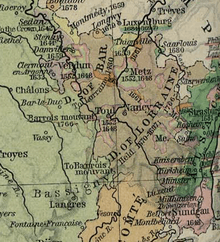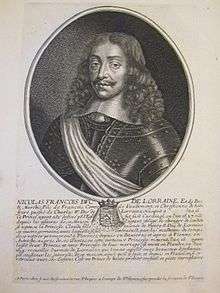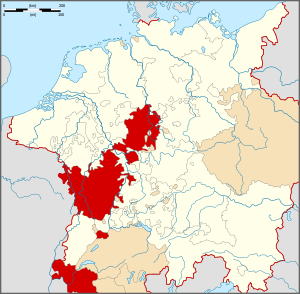Roman Catholic Diocese of Toul
The Diocese of Toul was a Roman Catholic diocese seated at Toul in present-day France. It existed from 365 until 1824. From 1048 until 1552 (de jure until 1648), it was also a state of the Holy Roman Empire.
| Bishopric of Toul | |||||||||
|---|---|---|---|---|---|---|---|---|---|
| Prince-bishopric of Holy Roman Empire | |||||||||
| 1048–1648 | |||||||||
 Coat of arms
| |||||||||
 The Three Bishoprics of Verdun, Metz and Toul | |||||||||
| Capital | Toul | ||||||||
| Historical era | Middle Ages | ||||||||
• Bishopric established | 365 | ||||||||
• Acquired territory | 1048 | ||||||||
| 1552 1648 | |||||||||
• Treaty of Westphalia recognises annexation | 1648 | ||||||||
| |||||||||
History
The diocese was located at the western edge of the Holy Roman Empire; it was bordered by France, the Duchy of Bar, and the Duchy of Lorraine. It was annexed to France by King Henry II in 1552, and that was recognized by the Holy Roman Empire in the Peace of Westphalia of 1648. It then was part of the province of the Three Bishoprics.
After the Duchy of Lorraine also became part of France in the 18th century, the Diocese of Toul was merged with the Diocese of Nancy into the Diocese of Nancy-Toul.
The Diocese of Toul belonged to the ecclesiastical province of the Archbishop of Trier.
Bishops
To 1000
- Mansuetus 338–375 (Saint Mansuy), first bishop
- Amon c. 400?
- Alchas c. 423?
- Gelsimus c. 455?
- Auspicius c. 478?
- Ursus around 490
- Aprus (Aper) 500–507
- Aladius 508–525?
- Trifsorich 525–532
- Dulcitius 532?–549
- Alodius c. 549
- Premon
- Antimund
- Eudolius c. 602
- Theofred 640–653
- Bodo of Toul c. 660
- Eborinus around 664
- Leudinus 667?–669
- Adeotatus 679–680
- Ermentheus c. 690?
- Magnald c. 695?
- Dodo c. 705
- Griboald 706–739?
- Godo 739?–756
- Jakob 756–767
- Borno 775–794
- Wannich 794?–813
- Frotar 814–846
- Arnulf 847–871
- Arnald 872–894
- Ludhelm 895–905
- Drogo 907–922
- Gosselin 922–962
- Gerard I 963–994 (Saint Gerard)
- Stephen 994–995
- Robert 995–996
- Berthold 996–1019
1000 to 1300
- Herman 1020–1026
- Bruno Egisheim-Dagsburg † (1026 - 12 February 1049; elected as Pope Leo IX, served until his death in 1054)
- Sede Vacant 1049-1051
- Odo 1052–1069
- Poppo 1070–1107
- Richwin of Commercy 1108–1126
- Heinrich I von Lothringen 1127-1167
- Peter of Brixey 1168–1192
- Odo of Vaudemont 1192–1197
- Matthias of Lorraine 1197–1206, † 1217
- Reinald of Chantilly 1210–1217
- Gerard II of Vaudemont 1218–1219
- Odo II of Sorcy 1219–1228
- Garin 1228–1230
- Roger of Marcey 1231–1251
- Giles of Sorcy 1253–1271
- Conrad II of Tübingen 1272–1296
- John I of Sierck 1296–1305
1300 to 1500
- Vito Venosa 1305–1306
- Odo III of Grançon 1306–1308
- Giacomo Ottone Colonna 1308–1309
- John II of Arzillières 1309–1320
- Amatus of Geneva 1320–1330
- Thomas of Bourlemont 1330–1353
- Bertram de la Tour 1353–1361
- Pietro di la Barreria 1361–1363
- John III of Hoya 1363–1372
- John IV of Neufchatel 1373–1384, † 1398
- Savin de Floxence 1384–1398
- Philip II de la Ville-sur-Illon 1399–1409
- Henry II de la Ville-sur-Illom 1409–1436
- Louis de Haraucourt 1437–1449
- William Fillatre 1449–1460
- John V de Chevrot 1460
- Anthony I of Neufchatel 1461–1495
- Ulric of Blankenberg 1495–1506
From 1500

- Hugh des Hazards 1506–1517
- John, Cardinal of Lorraine 1517–1524, † 1544 (Bishop of Verdun 1523–1544)
- Hector de Ailly-Rochefort 1526–1532
- John, Cardinal of Lorraine (again) 1532–1537
- Anthony II Pellagrin 1537–1542
- John of Lorraine-Guise (again) 1542–1543, † 1544
- Toussaint de Hossey 1543–1565
- Peter III de Châtelet 1565–1580
- Charles de Lorraine de Vaudémont 1580–1587 (Bishop of Verdun 1585–1587)
- Christopher de la Vallée 1589–1607
- John VII Porcelet de Maillane 1609–1624
- Nicholas II, Duke of Lorraine 1625–1634
- Charles Christian de Gournay 1634–1637
- Henri Arnauld 1637-1643
- Paolo Fiesco 1643–1645
- Jacques Lebret 1645
- Henri-Pons de Thiard de Bissy 29 March 1687 to 10 May 1704 (Bishop of Meaux 1704–1737)
- François Blouet de Camilly 1706–1723
- Scipion-Jérôme Begon 1723–1753
- Claude Drouâs de Boussey 1754–1773
- Etienne-François-Xavier des Michels de Champorcin (Stephen-Francis-Xavier des Michels de Champorcin), last bishop, 1773–1802
References
Bibliography
Reference Sources
- Gams, Pius Bonifatius (1873). Series episcoporum Ecclesiae catholicae: quotquot innotuerunt a beato Petro apostolo. Ratisbon: Typis et Sumptibus Georgii Josephi Manz. pp. 548–549. (Use with caution; obsolete)
- Eubel, Conradus (ed.) (1913). Hierarchia catholica, Tomus 1 (second ed.). Münster: Libreria Regensbergiana.CS1 maint: extra text: authors list (link) p. 301. (in Latin)
- Eubel, Conradus (ed.) (1914). Hierarchia catholica, Tomus 2 (second ed.). Münster: Libreria Regensbergiana.CS1 maint: extra text: authors list (link) p. 175.
- Eubel, Conradus (ed.) (1923). Hierarchia catholica, Tomus 3 (second ed.). Münster: Libreria Regensbergiana.CS1 maint: extra text: authors list (link)
- Gauchat, Patritius (Patrice) (1935). Hierarchia catholica IV (1592-1667). Münster: Libraria Regensbergiana. Retrieved 2016-07-06. p. 219.
- Ritzler, Remigius; Sefrin, Pirminus (1952). Hierarchia catholica medii et recentis aevi V (1667-1730). Patavii: Messagero di S. Antonio. Retrieved 2016-07-06.
Studies
- Jean, Armand (1891). Les évêques et les archevêques de France depuis 1682 jusqu'à 1801 (in French). Paris: A. Picard.
- Pisani, Paul (1907). Répertoire biographique de l'épiscopat constitutionnel (1791-1802) (in French). Paris: A. Picard et fils.
External links
- Bishopric of Toul at Catholic-hierarchy.org
